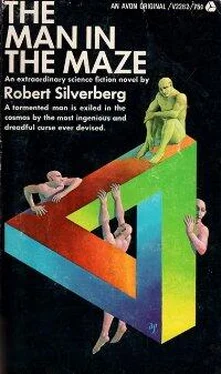One of them paused, bent, peered closely at the ground. It scooped up the eye that had been witnessing its activities. The image grew chaotic; Muller guessed that the eye was being passed from hand to hand. Suddenly there was darkness. The eye had been destroyed. The cube was played out.
After a moment of troubled silence Muller said, “They look very convincing.”
“They ought to be. They’re real.”
“Was this taken by some sort of extragalactic probe?”
“No,” Boardman said. “In our own galaxy.”
“Beta Hydri IV, then?”
“Yes.”
Muller repressed a shiver. “May I play it again, Charles?”
“Of course.”
He activated the cube a second time. Again the eye made the descent through the cloud layer; again it observed the rubbery trees; again the trio of aliens appeared, took nourishment from the trees, noticed the eye, destroyed it. Muller studied the images with cold fascination. He had never looked upon living sapient beings of another creation before. No one had, so far as he knew, until now.
The images faded from the cube.
Boardman said, “That was taken less than a month ago. We parked a drone ship fifty thousand kilometers up and dropped roughly a thousand eyes on Beta Hydri IV. At least half of them went straight to the bottom of the ocean. Most landed in uninhabited or uninteresting places. This is the only one that actually showed us a clear view of the aliens.”
“Why has it been decided to break our quarantine of this planet?”
Boardman slowly let out his breath. “We think it’s time we got in touch with them, Dick. We’ve been sniffing around them for ten years and we haven’t said hello yet. That isn’t neighborly. And since the Hydrans and ourselves are the only intelligent races in this whole damned galaxy—unless something’s hiding somewhere unlikely—we’ve come to the belief that we ought to commence friendly relations.”
“I don’t find your coyness very appealing,” Muller said bluntly. “A full-scale council decision was taken after close to a year of debate, and it was voted to leave the Hydrans alone for at least a century—unless they showed some sign of going into space. Who reversed that decision, and why, and when?”
Boardman smiled his crafty smile. But Muller knew that the only way to avoid being drawn into his web was to take a frontal approach. Slowly Boardman said, “I didn’t mean to seem deceptive, Dick. The decision was reversed by a council session eight months ago, while you were out Rigel way.”
“And the reason?”
“One of the extragalactic probes came back with convincing evidence that there’s at least one highly intelligent and quite superior species in one of our neighboring clusters.”
“Where?”
“It doesn’t matter, Dick. Pardon me, but I won’t tell you at this time.”
“All right.”
“Let’s just say that from what we know of them now, they’re much more than we can handle. They’ve got a galactic drive, and we can reasonably expect them to come visiting us one of these centuries—and when they do, we’ll have a problem. So it’s been voted to open contact with Beta Hydri IV ahead of schedule, by way of insurance against that day.”
“You mean,” Muller said, “that we want to make sure we’re on good terms with the other race of our own galaxy before the extragalactics show up?”
“Exactly.”
“I’ll take that drink now,” said Muller.
Boardman gestured. Muller tapped out a potent combination on the console, downed it quickly, ordered another. Suddenly he had a great deal to digest. He looked away from Boardman, picking up the vision cube and fingering it as though it were a sacred relic.
For a couple of centuries man had explored the stars without finding a trace of a rival. There were plenty of planets, and many of them were potentially habitable, and a surprising number were Earthlike to four or five places. That much had been expected. The sky is full of mainsequence suns, with a good many of the F-type and G-type stars most likely to support life. The process of planetogenesis is nothing remarkable, and most of those suns had complements of five to a dozen worlds, some of which were of the right size and mass and density slots to permit the retention of atmosphere and the convenient evolution of life, and a number of those worlds were situated within the orbital zone where they were best able to avoid extremes of temperature. So life abounded and the galaxy was a zoologist’s delight.
But in his helter-skelter expansion out of his own system man had found only the traces of former intelligent species. Beasts laired in the ruins of unimaginably ancient civilizations. The most spectacular ancient site was the maze of Lemnos; but other worlds too had their stumps of cities, their weathered foundations, their burial grounds and strewn potsherds. Space became an archaeologist’s delight, too. The collectors of alien animals and the collectors of alien relics were kept busy. Whole new scientific specialities burst into being. Societies that had vanished before the Pyramids had been conceived now underwent reconstruction.
A curious blight of extinction had come upon all the galaxy’s other intelligent races, though. Evidently they had flourished so long ago that not even their decadent children survived; they were one with Nineveh and Tyre, blotted out, cut off. Careful scrutiny showed that the youngest of the dozen or so known extrasolar intelligent cultures had perished eighty thousand years earlier.
The galaxy is wide; and man kept on looking, drawn to find his stellar companions by some perverse mixture of curiosity and dread. Though the warp drive provided speedy transport to all points within the universe, neither available personnel nor available ships could cope with the immensity of the surveying tasks. Several centuries after his intrusion into the galaxy, man was still making discoveries, some of them quite close to home. The star Beta Hydri had seven planets; and on the fourth was another sapient species.
There were no landings. The possibility of such a discovery had been examined well in advance, and plans had been drawn to avoid a blundering trespass of unpredictable consequences. The survey of Beta Hydri IV had been carried out from beyond its cloud layer. Cunning devices had measured the activity behind that tantalizing gray mask. Hydran energy production was known to a tolerance of a few million kilowatt hours; Hydran urban districts had been mapped, and their population density estimated; the level of Hydran industrial development had been calculated by a study of thermal radiations. There was an aggressive, growing, potent civilization down there, probably comparable in technical level to late twentieth-century Earth. There was only one significant difference: the Hydrans had not begun to enter space. That was the fault of the cloud layer. A race that never has seen the stars is not likely to show much desire to reach them.
Muller had been privy to the frantic conferences that followed the discovery of the Hydrans. He knew the reasons why they had been placed under quarantine, and he realized that only much more urgent reasons had resulted in the lifting of that quarantine. Unsure of its ability to handle a relationship with nonhuman beings, Earth had wisely chosen to keep away from the Hydrans for a while longer; but now all that was changed.
“What happens now?” Muller asked. “An expedition?”
“Yes.”
“How soon?”
“Within the next year, I’d say.”
Muller tensed. “Under whose leadership?”
“Perhaps yours, Dick.”
“Why ‘perhaps’?”
“You might not want it.”
“When I was eighteen,” Muller said, “I was with a girl out in the woods on Earth, in the California forest preserve, and we made love, and it wasn’t exactly my first time but the first time it worked out in any kind of proper way, and afterward we were lying on our backs looking up at the stars and I told her I was going to go out and walk around among them. And she said, Oh, Dick, how wonderful, but of course it wasn’t anything special I was saying. Any kid that age says it when he looks up at the stars. And I told her that I was going to discover things out in space, that men were going to remember me the way they remember Columbus and Magellan and the early astronauts and all. I said I was going to be right in the front of whatever was happening, that I was going to move through the stars like a god. I was very eloquent. I went on like that for about ten minutes, until we were both carried away by the wonder of it all, and I turned to her and she pulled me down on top of her and I turned my backside to the stars and worked hard to nail her to the Earth, and that was the night I grew my ambitions.” He laughed. “There are things we can say at eighteen that we can’t say again.”
Читать дальше












